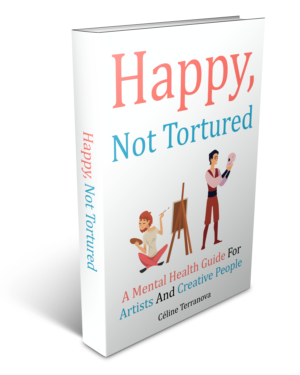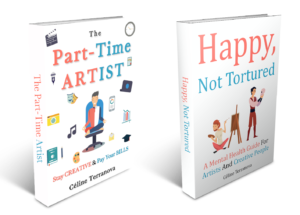Today, I want to talk about the little annoying voice in your head that makes your life miserable: the inner saboteur.
It prays on your deepest fears, and it frames situations into the worst possible interpretations. The inner saboteur rains on your successes and feeds on your failures. It ruins your relationships and eats your joy away. If it is too strong, it can lead to depression, anxiety and other issues. I know, I’ve been there.
You probably know what I’m talking about, even if you have a different name for it. Some call it the “critical voice”, or “the judge”. Whatever its name, it’s a pain in the ass, so let’s learn how to fight it!
Not So Inner
I think it’s important first to analyse where these destructive thoughts come from. We always assume that, because we think it, it comes solely from ourselves. But it’s completely wrong! Often, the inner saboteur regurgitate words that we have heard elsewhere.
Let’s take the example of a sentence that my inner saboteur loves to throw at me: “You’ll never be successful”. Is it really coming from me or is this a sentence that I’ve heard over and over, until I internalised it? Don’t get me wrong, this is one of my biggest fears, and I don’t need anyone to tell me this to think it. But an inner saboteur voice is made much stronger if it echoes other people’s voices.
Does your saboteur take the voice of someone you know, someone who is overly critical? Mine does. Some voices will come from your childhood, some will come from traumatic events, some will come from society in general.
This is why you need to surround yourself with a supportive entourage. Otherwise the critics and putdowns from the outside will resonate with your inner critic and paralyse you.
Recognise the Saboteur
This it the most crucial step into fighting your saboteur. You have to identify it in the first place! This is where things get tricky, because your inner saboteur is very clever. It disguises its poison under “rationalisation” or “realism”.
For example, mine tells me to “never rest on my laurels”, meaning never be too happy of a success because it’s arrogant. And the problem is, it passes as “sensible”. Yes, it is sensible to not spend too long celebrating something, because you always have to move and progress. But under the guise of “sensible”, it prevents me from celebrating altogether!
To overcome your inner saboteur, you will need to recognise its patterns and where it’s more likely to appear. Do you over-generalise? Do you project your feelings onto someone else? Do you jump to conclusion? Does your inner dialogue includes words like “always” or “never”? These are all signs that your saboteur is in charge.
Challenge the Saboteur
Now that you know when it’s in charge, you will need to challenge it. Question it. Fact-check it. There are flaws in its reasoning. Prove it wrong! Does you voice say that you are always making a fool of yourself? Bring up an example of a situation where you didn’t make a fool of yourself. Does your voice say that you are a failure? Bring up an example of a success you had.
The problem with challenging your voice is that, as I said earlier, it’s very clever. Most of the time, it will respond to your examples by rationalisations. It will say “but that’s an exception” or “things have changed, you’re not like that anymore”. Logic itself might not be enough.
That’s when separating yourself from your saboteur comes handy. Check out this short video with one of the stars from Rupaul’s Drag Race, who is no stranger to her inner saboteur:
I call my inner saboteur Ralph. It was a suggestion from my therapist, and I must say it’s a great advice. Giving a name to your saboteur allows you to take a distance from it and remove some of its power. You can also engage in a dialogue with it on a more “conscious” level, instead of letting the thoughts circle in your head. I talk to Ralph sometimes, I ask him to calm down, to shut up or to postpone its freakouts until I’m at home.
If you are plagued with a saboteur that is relentless, naming it might help you. Separate yourself from it, see it for what it is: an annoying idiot who should not be allowed too much time.
Select Your Thoughts
Another great technique to overcome your saboteur is to not trigger it in the first place by selecting helpful thoughts. We tend to think that everything that comes out of our head is true, but it’s actually completely wrong. Which means that you can make the decision to entertain constructive thoughts only instead of destructive ones.
You’ll notice that I use the word “constructive” instead of “positive”. Complete and total positivity is usually impossible. You can’t be positive no matter what happens, especially if it’s not your natural personality. Your mind will reject it. When I say constructive thoughts, I mean “thoughts that will help me move forward”. For example, let’s say that you are preparing to release a book:
- Destructive thought: “Nobody will read it” – it’s final, it’s gloomy and there’s nothing to do to change that.
- Positive thought: “It’s going to be super successful” – it’s too generic, there’s no proof or strategy, your brain will probably not believe it.
- Constructive thought: “Now it’s time to learn marketing to ensure this book is a success” – it’s open, it’s a strategy, and it’s believable.
It’s a mental exercise that is very difficult at the beginning, because it feels fake. Your saboteur will probably remind you every step of the way that you are deluding yourself. But if you do it systematically, you’ll notice a shift in your thought patterns. You won’t trigger the saboteur as often as you used to, because it has nothing to “grab”.
Be Kind to Yourself
Despite all these tactics, there will be days where you saboteur is just too strong for you. It still happens to me on occasions. Sometimes, no matter what you do, you are just having a bad day and nothing will change that.
That’s when you need to be extra nice to yourself. Watch something that makes you laugh. Read a good book instead of doing chores. Have a hot chocolate and stay in bed for another 15 minutes. I know you probably have a lot of responsibilities, but it’s crucial that you are kind to yourself on days where your saboteur is too powerful to counter.
Think of it this way: if you have a cold, you might still have to go to work but you will probably try to avoid doing activities that are too hard. You might eat healthy food and you’ll go to bed as soon as you get home. It’s the same if you have a “saboteur illness”. Bad mental health days are a real thing, even if they are not recognised by society.
Prepare a strategy when you have such a day. You could leave work early. You could go and sit in a coffee place alone to get some peaceful time. You could watch the series that always makes you feel better, or eat your favourite meal. The important part is to be nice to yourself until the storm passes.
And if your inner saboteur tells you that you are “too indulgent” or “a drama queen” because of this, let it be. It’s wrong. It’s stupid. It’s ignorant.
Don’t Let Your Saboteur Win!
Your inner saboteur will never leave you. You will have to cohabitate with its voice for the rest of your life. However, it can be a small, frightened voice in the corner of your mind, or it can be the showman at the forefront of your fears. Only you can decide and fight back. And I hope that with this article I gave you enough tactics to push back.
And don’t forget that you can get help if your inner voice is trying to harm you. You don’t need to be alone with these thoughts, there are people who can listen and help you.
Are you plagued with an inner saboteur? How do you deal with it? Has it taken its toll on your life? Let me know in the comments below!
Before You Go
Are you struggling to find enough time, energy or strength to pursue your dream to be an artist? Being an artist is hard because creativity is not enough: you need to also be your own coach, publicist, critic and money maker. It can be exhausting, frustrating and demoralising, especially when you have to deal with other pressures such as a day job or bills to pay.
I have dedicated the past two years to helping fellow artists reach their potential and be fulfilled with their career. You can benefit from my experience too! Check out my books, The Part-Time Artist and Happy Not Tortured for lots of advice and practical tips to get more of your creative life! Available in eBook and Paperback!
Céline is an author passionate about helping fellow artists reach their potential and live a happy, balanced life.




